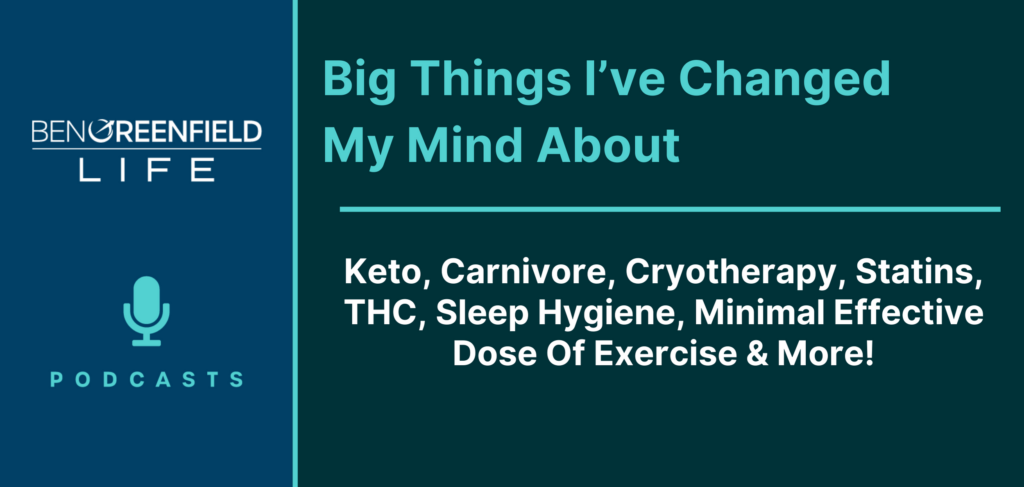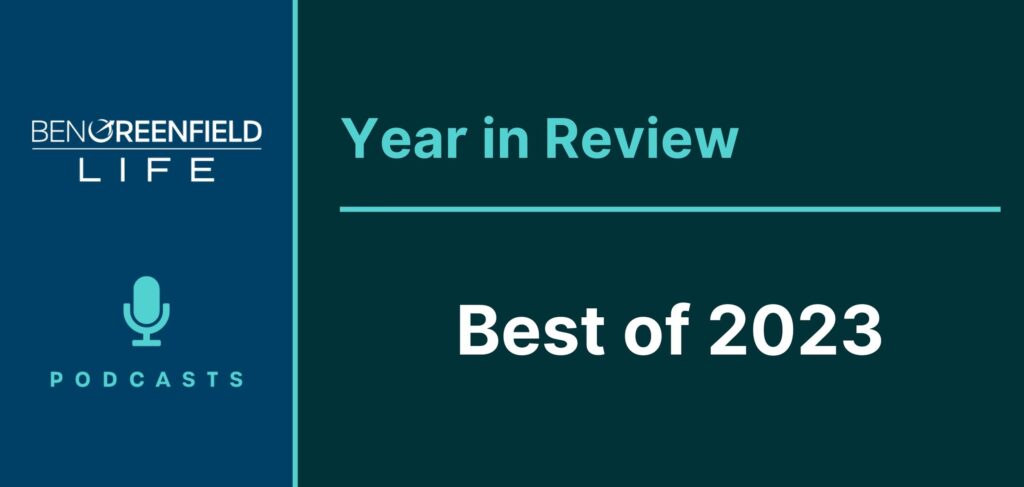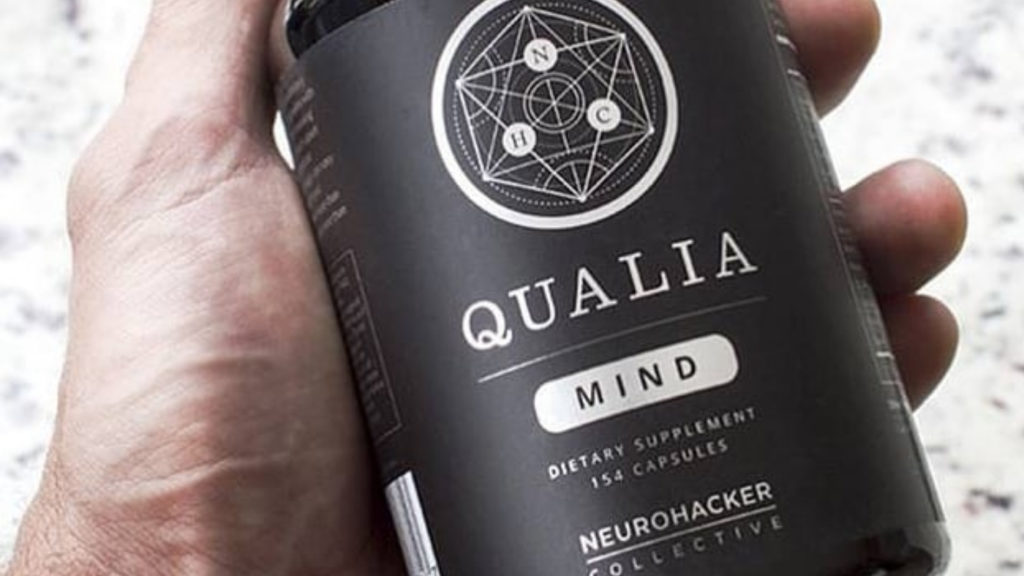July 28, 2020
It's been a keto-packed couple of weeks here at Ben Greenfield Fitness—starting with the article “All Of Your Burning Keto Questions Answered: Fasting On Keto, Keto For Fat Loss, Keto Nootropics & Supplements, & Much More!,” then the podcast “The Latest Research On Ketones & Ketosis For Performance & Recovery, Do Ketones Break A Fast, Using Ketones For 45 Days Of Crossfit Murph, Ketone Esters vs. Ketone Salts & More With Geoffrey Woo of H.V.M.N.,” and rounding out the week with a delicious Keto Pumpkin Pie Smoothie recipe I posted on Instagram…
…and the fat-fueled fun continues today with a guest article by Geoffrey Woo, recent podcast guest of mine and co-founder and CEO of H.V.M.N. and Dr. Latt Mansor, research lead at H.V.M.N and a deep well of knowledge on all things ketones.
H.V.M.N., short for “Health Via Modern Nutrition” is a food and supplement company that focuses on metabolic performance and health. They've played a big part in popularizing ketones as a food group and “fourth macronutrient” beyond fats, proteins, and carbohydrates, H.V.M.N.'s products fuel some of the world's top performers, athletes, and military service members.
In today's article, co-penned by Geoffrey and Dr. Mansor, you'll discover how the recent invention of exogenous ketones has unlocked vast research potential in the realm of ketosis; some exciting, not yet widely discussed or understood uses for ketones (including recovery, cognition, sleep, anti-catabolic applications, and more); as well as where future research in the field of ketosis is headed.
How Exogenous Ketones Have Unlocked Ketosis Research
Ketone esters were broadly introduced into the commercial market in 2017 via the delivery mechanism of the now increasingly popular compound called a “ketone ester”. This ketone ester supplement was based on work initiated by the Defense Advanced Research Projects Agency (DARPA), which sought to determine if a diet of ketone esters could enhance the metabolic and cognitive performance of warfighters under extreme physiological and emotional stress.
The commercial availability of ketone esters accelerated a number of research programs, sports practices, and hobbyist experimentation—all of which you're about to learn more about.
While many of the original DARPA awardees focused on therapeutic applications of ketone esters, groups at Oxford University, Bath University, and KU Leuven investigated the possibility of ketone esters for enhancing human performance. Early data describing an ergogenic (performance-enhancing) effect of ~2% is well known in sports nutrition, so in this article, we’ll focus on applications and protocols that derive from case studies and anecdotes collected from our experience as practitioners and consultants to some of the world’s best athletes and performers. At the cutting edge, there aren't any randomized-controlled trials and the goal of this article is not to claim as such. We will simply present insights to serve as a potential signal beacon for more formal research on the horizon.
Today, ketosis is one of the most active research areas in human metabolism and physiology. Research groups are currently investigating it as a tool for a wide range of indications—from type 2 diabetes remission to enhancing human athletic performance. Researchers are now starting to uncover and unpack the underlying mechanisms of this metabolic state that may lead to new strategies—such as better managing Alzheimer’s by using ketones as an alternate fuel source for the brain and as a fasting mimetic for enhancing human longevity.
This explosion of interest within the last five years can largely be credited to two factors:
- The work of early tastemakers such as Dom D’Agostino, Peter Attia, Tim Ferriss, and Joe Rogan, and Ben Greenfeld (particularly via his participation in Dr. Jeff Volek's FASTER study) making decades of metabolism research accessible for casual enthusiasts and practical for fitness hobbyists.
- The introduction of commercially-available and (relatively) inexpensive exogenous ketones as a novel tool to further probe the intricacies of the biochemistry and metabolism of ketosis.
Affordable, commercially-available exogenous ketones have unlocked the ability to study the state of ketosis “on-demand.” The metabolic state of ketosis is no longer inextricably intertwined with a ketogenic diet. We can now ask questions like, “What if ketones could be mixed with a high-carb diet?” “What if ketones could be spiked, to the equivalent of 10 days fasted, in 30 minutes?” and, from a clinical trial management perspective, “What if hundreds of study participants could easily be put in ketosis vs. the struggle of regulating whether or not they are cheating?”
As you can imagine, exogenous ketones have unlocked a new world of research questions. Our area of expertise is exogenous ketosis and in particular ketone esters. Before we dive into it, it’s important to define the two:
- Ketosis is the presence of ketones in the body and brain
- Ketogenesis is the endogenous production of ketone bodies from the liver
These concepts are conflated in older literature because there was no way to reach ketosis without going through endogenous ketogenesis.
However, with the commercial availability of exogenous ketones like ketone esters and ketone salts, it is now generally accessible for anyone—from elite performers to researchers to average consumers—to start experimenting with ketosis, quickly and easily.
Ketones For Recovery
While ketone esters are more popularly applied for an ergogenic effect during exercise, early studies and data show that they may actually have more potential for recovery. To date, there are three studies that monitored recovery after exercise following the ingestion of ketone esters. All three studies found some form of benefit in recovery when taken with recommended macronutrients such as carbohydrates and protein after a workout. The findings of these studies show that ketone esters…
- Increase glucose uptake, insulin secretion, and glycogen resynthesis in recovery.
- Promote mTORC1 signaling in recovery following exercise when taken together with carbohydrates and protein.
- Prevent overreaching symptoms and help athletes improve performance over the course of 3 weeks when used as a recovery intervention.
Based on the data thus far, we can conclude that ketone esters, when taken together with glucose only, may increase insulin secretion, glucose uptake, and glycogen synthesis—while ketone esters taken with protein (especially containing leucine) and glucose do not change glycogen synthesis but instead activate mTOR targets and upregulate leucine-mediated protein synthesis.
So what does this mean in terms of application? How could you use this information to augment your current nutritional strategy?
In situations where your recovery period is short (e.g. ultramarathon with minimal breaks between segments or military use cases that needs optimal endurance and output with minimal rest), ketone esters and glucose administration may provide a better option to ensure that glycogen is replenished in a shorter amount of time before you need to expend energy for physical performance again. Otherwise, if given ample amounts of carbohydrates that exceed the threshold of maximal glycogen storage over 24 hours, glycogen stores will replete themselves to baseline levels. Therefore, for a better nutritional strategy for recovery, ketone esters with glucose and protein would be a better option, as you will still replenish your glycogen levels at a normal rate while benefiting from the repair and recovery of protein synthesis upregulation via activation of mTOR.
Note from Ben: I've experimented with this approach, and if you do it, I recommend a high molecular weight, high glycemic index branched dextrin combined with the ketone ester post-workout. Both Vitargo and Glycofuse are good options.
The current data suggest that only a single dose of ketone ester taken after exercise and before bed is enough to exert the ergogenic effects in recovery and all the studies achieved >4 mM blood beta-hydroxybutyrate (BHB)—one of the three “physiological” ketones that are produced by the body—following ketone ester ingestion.
Further studies may be needed to determine the minimal dose of exogenous ketones to achieve the threshold of blood BHB to have such effects, and if there is a minimum concentration of blood BHB to achieve such feat, what would the drop off point be as blood BHB concentrations gradually return to baseline levels?
Anti-Catabolic Applications & Weight Cutting
A peculiar artifact in sports is the concept of weight classes. From combat sports like wrestling or MMA to sports that depend on power to weight ratios like powerlifting and rowing, exogenous ketones introduce a whole new dimension to the game of managing and optimizing weight.
So how can you lose as much weight as possible in one day, and rejuvenate the next day to obtain a size and weight advantage over your competition—all without becoming so drained and weak that you're rendered ineffective?
There have been a number of athletes and groups in these disciplines looking at ketone esters to make this grueling process easier. In one study, consuming 1.9 kcal/kg of ketone esters after an overnight fast was shown to suppress appetite through ghrelin, the “hunger hormone”—and reducing appetite is obviously valuable. This insight also suggests why some advocates claim that a ketogenic diet is more satiating than a standard Western diet. There are interesting implications beyond just managing appetite for the weight cutting process. Ketone bodies may play a role in different mechanisms to exert their anti-catabolic effects.
Firstly, ketone bodies can suppress the rates of protein breakdown to cater for gluconeogenesis (production of glucose from non-carbohydrate precursors such as proteins) in starvation. One study suggested that ketone bodies play a vital role as potent anti-catabolic agents on both systemic and skeletal muscle-specific levels, where the reduction of protein breakdown catalyzed by BHB overrides inhibition of synthesis.
Secondly, ketone bodies may increase protein synthesis via mTOR activation. One study showed that ketone esters activate leucine-mediated protein synthesis and mTOR downstream targets in subjects who undertook a bout of intense glycogen-depleting exercise followed by a 5-h recovery period in which they ingested a protein/carbohydrate mixture as well as a ketone ester mixture of 0.5 g per kg of body weight. Following an intense bout of exercise, as energy has been used up, there will be an energy imbalance in the skeletal muscles, and this is regulated by AMP-activated protein kinase (AMPK). The energy balance in skeletal muscles needs to be restored before mTOR activation can take place to upregulate protein synthesis. In other words, you need to replenish the energy you have lost before your body even begins to initiate repair and recovery. Therefore, ketone ester ingestion for recovery may provide the additional substrate that increases oxidative ATP generation and subsequently decreases AMPK activation to allow protein synthesis.
Cognitive & Sleep Applications
The impact of ketones on the brain is an exciting experimental area. Because ketones cross the blood-brain barrier and the brain readily metabolizes BHB, there is definitely a reason to suspect that downstream metabolism in neurons is altered from a more typical glucose metabolism.
This is an increasingly growing research area, and we’ve done some early work in this area in collaboration with the US military. This research is yet to be published, but stay tuned to our blog for updates.
One of the more interesting anecdotal cases is the use of ketones as an anxiolytic ahead of big presentations or talks. Many users talk about being more present or being more “in flow.” For example, Dr. Rhonda Patrick on the Joe Rogan podcast has talked about using ketones before taping her own podcast. There have been a number of animal studies in this area that propose mechanisms, but nothing has yet been formally published in humans.
In addition to reducing anxiety, ketones have been gaining popularity as a sleep-enhancing tool. Some elite Tour athletes have been using half a ketone ester drink right before bed as part of their recovery protocol. We’ve collected numerous anecdotal reports and social media reports from hobbyists and citizen scientists that ketones before sleep seem to increase HRV, a sign of better parasympathetic response and increase deep sleep scores, as tracked by sleep tracking devices like the Oura ring.
Part of the sleep boost could be related to the anxiolytic effect. Other mechanisms include modulation of GABAergic, glutamatergic, and adenosinergic systems by ketone bodies. In a mouse model of Alzheimer’s disease, the ketone ester lessened amyloid β-peptide and hyperphosphorylated τ deposition, which lessened anxiety and improved cognition. The specific metabolic pathway changes by ketone bodies associated with the nervous system—leading to benefits in central nervous system diseases, especially in humans—are yet to be determined, and further studies can be heavily influenced by model-, dose-, method- and regimen-dependent variables.
Nonetheless, this area of research is very exciting, as mental health has always been overlooked and ketone esters provide a great addition to further refine the nutrition modulation strategies on brain metabolism and diseases.
Ketone Stacks
Many of the most seasoned, adventurous, or experienced ketone users, like Ben, are creating and experimenting with various ketone stacks, some of which Ben and Geoff Woo discuss in the recent podcast they recorded together.
The current gold standard for stacking ketones combines ketone esters with carbohydrates before a bout of endurance racing. This is the protocol that cyclist Vittoria Bussi used for her pre-race nutrition before setting the world record in the Hour back in 2018. Ben used this strategy with 75g of glucose and 2 servings of ketone esters before a Tough Mudder in Vegas (which he won) and later described it as “pure rocket fuel.”
We help various athletes experiment with other additions like stacking caffeine as well as buffers like sodium bicarbonate to good anecdotal effect. The data for this is still very limited and the mechanisms may be speculative, but in recent studies bicarbonate levels were decreased after exercise and ketone ester ingestion, so the hypothesis is adding some form of bicarbonate along the administration of ketone esters may help with acidity caused by the rise in blood BHB and help improve performance.
Additionally, there might be further value to reap by further stacking ketone esters with other known ergogenics or nootropics like nicotine. In terms of the brain, there is still so much to be explored, and there is early work trying to understand how one might be able to apply ketones to brain insults like traumatic brain injuries. Interventions like hyperbaric oxygen therapy, omega 3s, and more exotic derivatives of Omega-3s like specialized pro-resolving mediators (SPM) have been explored on a standalone basis, and there seem to be overlapping mechanisms suggesting synergy in combination with ketones. There have also been whispers with people experimenting with plant medicines and other psychoactive substances in conjunction with ketosis as well.
Note from Ben: after a fascinating dinner discussion with a MAPS researcher about the ability of high levels of ketone bodies to enhance plant medicine experiences, I have used ketone esters prior to plant medicine ceremonies and during a day of micro-dosing and found it produces a profound effect in terms of upregulating the experience in a very noticeable way, likely due to the reasons cited above.
Future Research Areas
While the field has come a long way, we’re still in the very early innings of the ketone ester story. As we discover the effects of ketone esters, in not only organ-specific functions but also on a systemic level, more and more researchers and enthusiasts are venturing into using exogenous ketones as potential nutritional therapy for different diseases.
This includes diabetes, cardiovascular disease, Alzheimer’s disease, and certain types of cancers (as supplementation to complement chemotherapy).
We predict and anticipate future studies will fall into these categories of research:
- Human Performance
- Determining the optimal level of exogenous ketones and ideal combinations of nutrients and supplements for performance enhancement, both physically and cognitively.
- Effects of exogenous ketones on recovery and its mechanisms, including protein and glycogen resynthesis, sleep, growth hormone, IGF-1, and other endocrine markers.
- Longevity and Well-being
- Continual research to be done on the role of ketones (both endogenous and exogenous) in aging and investigating the mechanisms that drive healthy aging from transcription to translation and downstream cascade of pathways—including the role of betahydroxybutyrlation, where BHB impacts DNA structure in an analogous way, as methylation and acetylation.
- Role of ketones in long-term inflammation suppression and antioxidative action.
- Therapeutic Intervention for Diseases
- Glycemic control in diabetes and role in achieving sustainable diabetes remission.
- Role of ketones as a preventative therapy for neurodegenerative diseases as data showed ketones may improve brain network stability in young adults.
- Elucidate the energy-substrate flux with exogenous ketones in patients with heart failure.
- Determine the mechanism of action of exogenous ketones in complementing chemotherapy and in reducing its side effects.
Summary
Ben here again. Exogenous ketones, like the H.V.M.N. Ketone Esters that Geoff's company produces, have broadened ketosis research far beyond what was once possible. With the ability to get into ketosis faster than ever, a whole new world of applications for exogenous ketones has been unlocked.
This includes enhanced recovery, improved athletic performance, appetite suppression, anti-catabolic effects, reduced anxiety and increased deep sleep, and beyond.
For more on ketosis, exogenous ketones, and the keto diet, be sure to check out my recently published podcast and article, my personal choice for exogenous ketones, H.V.M.N. Ketone Esters, as well as all of my other resources below:
- Ketosis vs. Carnivore Diet, Why Ketosis Isn’t For Everyone, & How To Do Ketosis & Carnivore “The Right Way.”
- KetoFasting: The Dark Side of Fasting & Ketosis (+How To Use Cyclic Ketosis To Fix The Issues).
- Building Muscle On A Ketogenic Diet, Little-Known Keto Mistakes, The Best Supplements For A Ketogenic Diet & Much More!
- The Biggest Common Keto Mistakes (& How to Fix Every Metabolic Problem With A Low-Carb Diet In Just 7 Seconds).
- Why A High-Fat, Ketogenic Diet Chock Full Of Saturated Fat, Coconut Oil & Butter Could Be Destroying Your Brain (& What To Do About It).
- The Keto Reset Diet: Reboot Your Metabolism in 21 Days and Burn Fat Forever.
- Building Muscle & Testosterone On A Ketogenic Diet, Food Combining, Psychedelic Experimentation, Natural Depression Remedies & More!
- How To Maximize Ketosis, Should You Have Sex Before Competition, Do Power Poses Really Work & More.
- Cyclic Ketosis, “Thinkitating,” Bad-Ass Meditation, Morning Routines & More With Quest Nutrition Founder Tom Bilyeu.
- Six-Egg Breakfasts, Ketosis For Bodybuilders, Resetting Weed Tolerance, Kratom Experimentation & Much More With The Mindpump Guys!
- Everything You Need To Know About How To Use Amino Acids For Muscle Gain, Appetite Control, Injury Repair, Ketosis And More.
- Could This Ketosis-Based Elixir Hold The Key To Weight Loss, World Record Performances, Brain Healing, and More?
As always, leave your thoughts, questions, or comments below, and Geoffrey, Dr. Mansor, or I will be happy to respond.














Hi Ben – Do you recommend ever stacking Kion Aminos with HVMN Ketones for performance or any other circumstance?
Yes, you can take ketones and aminos simultaneously. If you read both my articles on ketosis and aminos you will see that they have differing mechanisms of action. On non workout days, SPACE them evenly throughout the day, but actual timing of these do not matter on a non exercise day. Although theoretically you should use these at a time when you need the most cognitive benefit — https://bengreenfieldlife.com/article/supplements-articles/how-to-use-amino-acids
Hello,
Just wanted to share these keto recipes with you https://bit.ly/3pWq9l2
I really enjoy reading your keto’s Article.
Yeah indeed they are good articles, what do you think about this custom keto diet, it works both for men and women
https://bit.ly/35hbwza
BODYBUILDING QUESTIONS OF TRUTH
Today we will discuss the best exercise questions these exercise questions will blow your mind faster. Visit our website for more fitness tips, burn your fat with home remedies easily,
hey ben, i really love your content on keto diet, it’s really amazing…
so what do you think about the PROVEN BIGGEST BLOCKBUSTER https://bit.ly/2Eq8K0b
Ben, I love your contents about ketos, I have been on the keto diet for few weeks now and I have seen a tremendous result I hope this keto diet will be a benefit https://bit.ly/3hJTdH4
Hi I love your content at the moment I’m using a keto diet which has got me insane results: losing 5kg in 3 and a half week. I wanted to share it with you for free!
https://docs.google.com/document/d/1SamTvDCwY1STqDsbWSUnBYdQ2l6dyjdDwCrxcMc7m48/edit?usp=sharing
Hi Ben, based on the information in this article, would you think ingesting ketones in your morning water upon awakening or in your morning smoothie (that’s low carb, high fat, and moderate levels of protein) would be more beneficial for longevity purposes?
Ben- first time, long time. Question regarding your drink recipe replacing alcohol with 1 3 Butanediol.
How much 1 3 Butanediol to mix with ginger beer and lime?
Just found your question! It's anywhere from 10 to 50 milliliters of 1,3-Butanediol.